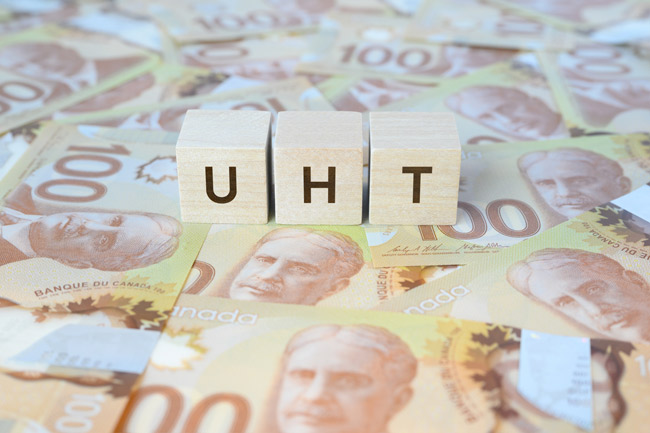The Tax Blog for Smart Canadians
Tips and tricks for Canadian tax filers at every stage of life
From UFile's tax expert Gerry Vittoratos.
Underused Housing Tax (UHT)

What is the UHT
The Underused Housing Tax (UHT) is an annual 1% tax that took effect on January 1, 2022. It is charged to non-resident, non-Canadian owned residential real estate in Canada that is considered to be vacant or underused.
Who is expected to pay it?
All property owners might be subject to the 1% tax, with the exception of “excluded owners.” These are:
- an individual that is a Canadian citizen or a permanent resident of Canada;
- a publicly listed Canadian corporation;
- a registered charity;
- a cooperative housing corporation;
- an Indigenous governing body or a corporation owned by an Indigenous governing body;
- a municipality or a corporation owned by a municipality;
- the government of Canada or an agent of the Government of Canada;
- the government of a province or an agent of the government of a province;
- certain other public service bodies (e.g. universities, public colleges, school authorities, hospital authorities).
Starting in 2023, “specified Canadian corporations” (over 90% of shares are Canadian owned), partners of “specified Canadian partnerships” (all partners are Canadian) and trustees of “specified Canadian trusts” (beneficiaries are exclusively Canadian) will also be excluded owners.
Anybody who is not an excluded owner is considered an “affected owner” and might be subject to the UHT. Affected owners may be able to qualify for an exemption from the UHT (see section below), but they must file the annual information return to declare their exemption. Excluded owners do not have to file any return or pay the tax.
From the list of excluded owners above, we can clearly see that the federal government is targeting non-residents who own property in Canada which they are underusing.
Exemptions for affected owners
As mentioned above, an affected owner would be subject to the UHT for the calendar year unless they qualify for an exemption in respect of their interest in the property for that calendar year. Affected owners qualifying for an exemption are required to file the annual declaration and claim the applicable exemption.
Exemptions are:
- Qualifying occupancy: the property must be occupied in periods of at least one month that total at least 180 days of the year.
- Property not suitable for year-round use: the property is uninhabitable (e.g. not winterized) or inaccessible (e.g. access road not winter maintained) for a portion of the year and is therefore not suitable for year-round use.
- Year of acquisition of an interest in property: an owner’s interest in the property would be exempt for the calendar year in which the owner first acquires such interest in the property (did not own same property in the last 10 years).
- Person died during the calendar year or the prior calendar year: an owner’s interest in the property would be exempt for the calendar year in which the death occurred and for the following calendar year.
- Personal or other legal representative of deceased individual: the deceased person exemption (see above) would extend to the personal or other legal representative of the deceased owner (e.g. trustee of the estate of the deceased individual).
- Death of other owner: if an owner of a residential property dies and they held at least a 25% interest in the property on the date of death, any other owner’s interest in the property would be exempt for the calendar year in which the death occurred and for the subsequent calendar year.
- Newly constructed property: an owner’s interest in a residential property would be exempt for a calendar year if the property is a newly constructed property that was not substantially completed before April 1 of the calendar year due to being under construction.
- New property held by a developer as inventory for sale: an owner’s interest in a residential property would be exempt for a calendar year if the property is held by the owner as inventory on December 31 of the calendar year.
How is the UHT calculated?
The UHT represents 1% of the assessed value of the property (property tax bill). However, the owner could elect to charge the tax on the property’s fair market value instead. The tax is charged on an annual basis.
What forms are required?
Form UHT-2900 is a new annual information return that was created to pay for the tax or claim an exemption for affected owners. The return is ordinarily due by April 30th of the following calendar year. However, the CRA has extended to April 30, 2024, the deadline to file the 2022 return.
Penalties will apply for affected owners who file late, even those who qualify for an exemption.
Want to learn more? Connect with us on Facebook and Twitter for news and updates on tax return and UFile online tax software. Visit Let's Talk Tax to get accurate answers to all your questions about your tax return.
 Presented by UFile's tax expert
Presented by UFile's tax expert
Gerry Vittoratos
MTax
Categories
- Managing finances (33)
- Netfile (1)
- Saving taxes (54)
Last Blog posts
-
Separations
Apr 10, 2025
-
Employee vs self-employed
Apr 1, 2025
-
Five useful tax return credits
Mar 16, 2025
-
Tax Update 2024
Feb 11, 2025
-
Changes to rental income for short-term rentals
Jan 29, 2025
-
New Tax Rules for Capital Gains: What You Need to Know
Jan 16, 2025
-
CPP additional contributions
May 13, 2024
-
Death and taxes
May 1, 2024
-
Top family credits and benefits
Mar 25, 2024
-
Comparing the RRSP and the TFSA with the FHSA
Feb 21, 2024
More questions? We have answers.
Now with FREE TELEPHONE SUPPORT.
(Long distance charges may apply.)

Privacy Statement Contact Us
© 2025 Thomson Reuters/Tax & Accounting. All rights reserved.


